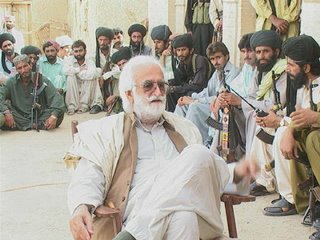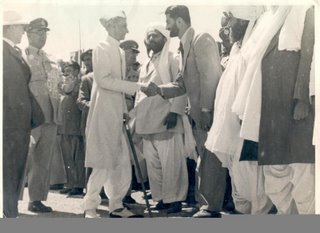Tiger, tiger, burning bright
In the forests of the night,
What immortal hand or eye
Could frame thy fearful symmetry?
In what distant deeps or skies
Burnt the fire of thine eyes?
On what wings dare he aspire?
What the hand dare seize the fire?
- William Blake
 The Tiger of Baluchistan, Nawab Akbar Khan Bugti, roared his last on 26 August, 2006 as Pakistani Air Force planes levelled his cave complex in the mountains of Baluchistan. At the grand age of 79, and with his trusted men by his side, they went down fighting to the last, taking out dozens of Pakistani army commandos.
The Tiger of Baluchistan, Nawab Akbar Khan Bugti, roared his last on 26 August, 2006 as Pakistani Air Force planes levelled his cave complex in the mountains of Baluchistan. At the grand age of 79, and with his trusted men by his side, they went down fighting to the last, taking out dozens of Pakistani army commandos.
The grand old man of Baluchistan, Nawab Akbar Khan Bugti was Tumandar (head) of the Warrior Bugti tribe. The Bugti are a warrior race, tracing their origins back 2,000 years to Aleppo in Syria. For the last 1,000 years or more, they have lived in present-day Pakistan, Iran and Afghanistan. The Bugtis' were renowned for their attacks in the First Afghan War against the British and they were only subdued in 1890, after a conflict which began in 1845.
Nawab Akbar Khan Bugti, was unlike anything what the term tribal leader would bring to mind. He did his studies from Oxford, London and was also known as grandson of Sir Shahbaz Khan Bugti, who was awarded the Knight of the British Empire for bravery on the battle fields. Nawab Bugti was known to many as a dictator, or an iron fisted ruler, irrespective of that he was a leader widely respected in Pakistan and revered in Baluchistan.
In Pakistan, he was known as "A person who never refused dialogue, who in the capacity of member Shahi Jirga at the time of establishment of Pakistan made Baluchistan a part of the country, someone who has been the member of first constituent assembly of the country, someone who took oath of defense and development of the country. Someone who has been Member National Assembly, Governor and Chief Minister of the province. Who has been willing to talk about the proposals of the Parliamentary Committee until the last breath.”
Baluchistan is Pakistan's biggest province, and is said to be the richest in mineral resources. It is also a major supplier of natural gas to the country. However, despite all this natural wealth, there is wide spread resentment among local people that the wealth being tapped by teh Central Government of Paksitan does not relfect in the development of the region or jobs for locals. This resentment has flared in four seperate revolts by Baluchi Nationalists who have been time and time again been crushed by the Pakistani Army.
Nawab Akbar Bugti was always part of the government and his role as Governor and Cheif Minister in different stints always saw him choose the political path to resolve the problems of his people.He took up arms against the Pakistan Government only to drive home his point that there were excesses in the way his people were treated by the Pakistani Army deployed there. And in a tribal society where violence is the preferred means of getting things done, he always left open the door of dialogue and diplomacy which went hand in hand with his armed conflict.
His troubles started with his fallout with Pakistani President Musharraf. Both disliked each other and it nothing short of a showdown brewing between a Tribal Leader and a Military General. They were reported to have traded threats publicly a few days before the attack.
India, always looking for a chance to point out flaws, commented that it was unfortunate that Pakistan had used excessive force instead of dialogue. But in this world of self interests, India has always compared Baluchistan with the Kashmiri Issue. Sounds ridiculous? How can Baluchistan be like Kashmir? The answers lie in the history of the region which has been long relegated to dusty history books.
Baluchistan shares its western border with Iranian Balochistan, Afghanistan and the Federally Administered Tribal Areas to the north and Punjab and Sindh Provinces to the east. To the south is the Arabian Sea. Dera Bugti district is in the south west of Baluchistan province of Pakistan. Dera Bugti is named after its headquarter town 'Dera Bugti'. Dera (a Balochi word) means `abode' or `habitat', while `Bugti' is the name of the major Baloch tribe. Thus Dera Bugti means the abode of the Bugtis, the dominant tribe of this district. This region was largely under Iranian control and the autonomous principality of Kalat.
The British wrested control away from the Khan of Kalat in the early 1840s and it became the staging ground for the various Afghan-British wars in the later half of 19th century. The 1876 treaty between the Khan of Kalat and Robert Sandeman accepted the independence of the Kalat as an allied state with British military outposts in the region. After the 1878 Afghan War, the British established Baluchistan as a provincial entity centered around the municipality of Quetta. The administrative and legislative matters of Baluchistan for the late 19th and early 20th century was then largely controlled from British India.
Around the 1930s, Baluchi nationalist parties emerged to contest for freedom from British rule. They took the princely State of Kalat as the focal point of a free and united Baluchistan.
Allama Mohammad Iqbal's (credited with first proposing the idea of an independent state for Indian Muslims, which would later inspire the creation of Pakistan) vision of autonomous federation of Muslim state included Baluchistan but the Khan of Kalat never brought into the nationalist paradigm, arguing that the Kalat had special treaty powers. Baglar Begi Khan declared the independence of Kalat on August 15, 1947. He assured Pakistan that Kalat will participate in the defense and infrastructure of Pakistan but will be autonomous. That didn't go over well at all and the Pakistani army entered the region to occupy the area immediately.
On Mar 27, 1948, the Khan of Kalat gave in to the State of Pakistan and his old attorney Mohammad Ali Jinnah (Founder of Pakistan). His brother Prince Abdul Karim Khan refused to surrender and revolted until his arrest in 1950. Baluchistan was put under Governor General control and no elective body was formed in Baluchistan until 1973.
Kashmir, a erstwhile princely state under British India was overrun by the armies of India and Pakistan who raced each other to claim the state at the time of Independence. Finally, drawing up the infamous Line of Control (LOC) where both armies could not advance further, which cut through Kashmir into two halves. Now, Pakistan accuses India and the neighboring Karzai government of Afghanistan of arming and training Baluchi rebels and promoting violence in Pakistan.
Pakistan needs to take a reality check and ignore its neighbours and listen to its people. It is not the time to play politics. Violence and trouble are signs of a discontent people. The people of Baluchistan are their own and the Pakistani government should not adopt an unreasonable and stubborn stance similar to Gen Yayha Khan in East Pakistan which finally resulted in the creation of Bangladesh. The Pakistani Media said his death could fuel Baloch nationalism and could end up as the second biggest blunder by the military since the execution of former prime minister Zulfikar Ali Bhutto in 1979. “Whoever in the national security establishment decided to eliminate Nawab Bugti physically is clueless about the force of politics, history and nationalism,” Daily Times said in its editorial.
Did Nawab Akbar Khan Bugti, deserve a death of this nature will be long debated, once the dust settles. By this attack Musharraf has created a martyr and has lost the trust of the Baluchi people. Threatening and killing an old man of nearly 80 years, who has been part of the nation from its birth, a governor and chief minister and respected politician does not go well with the common masses. Pakistan has for long struggled in its desire to have free and democratic elections with successes and bitter failures.
Now it is the time for change and a time to listen to the grievances of the people. Pakistan has long ignored and covered up internal strife, but now the very fabric of the nation lies in danger of being torn. In the Pak Tribune yesterday, the Pakistan Muslim League (PML-N), one of the many parties decrying the attack stated, “… the government is playing politics of power. Akbar Bugti who used to be part of the national political stream is killed being considered terrorist. The country is being pushed towards civil war.”
"Let them win their battles, the Baluch will win the war!" By fighting and dying for the cause of the common people even a tyrant becomes a hero. Dreaded warlord or respected leader of the masses, his death and words “It is better to die quickly in the mountains than slowly in your bed", has thousands of youth marching in the streets of Baluchistan ready to hold the Kalashnikovs he left behind. The Tiger may have roared his last but it may just be what unites his people for a better future and peace.
“A house divided against itself cannot stand” - Abraham Lincoln
 Nawab Akbar Khan Bugti welcomes Mohammad Ali Jinnah (Quaid-e-Azam) in Baluchistan. (1947 - Source unknown)
Nawab Akbar Khan Bugti welcomes Mohammad Ali Jinnah (Quaid-e-Azam) in Baluchistan. (1947 - Source unknown)



2 comments:
A shame indeed! When, India is looking at nothing less than a shot at the UN General Secretary Post and a permanent berth on the Security Council, you would expect them to rise above petty politics.
Anyways, as written it is time for Pakistan to get its house in order, even though India may be affected in the long term. Cause Pakistan is burning now!
i dont understand is y good ppl are not recognised for their struggle. y are the ppl of pakistan being forced to ignore this fact?? y?? i always keep hearing, the bad stories of pakistan. The indians are soo stupid , tat they dont seem to understand the meaning of humanity. we shud see the pain of those ppl , who are going through this big disaster. i mean who gave the dictator this rite to kill?, when he knows wat pain the ppl of baluchistan had gone thru... just for name sake, war is begun and kills the expectations of the pakistanis. and above all, india, is just interested for a fight without knwg tat those ppl, out there, are first humans. Wake up India and try to love others outside ur community. Right now pakistan needs ur help.
Post a Comment